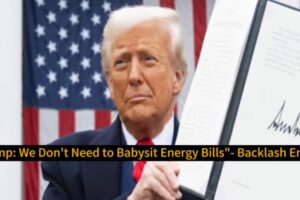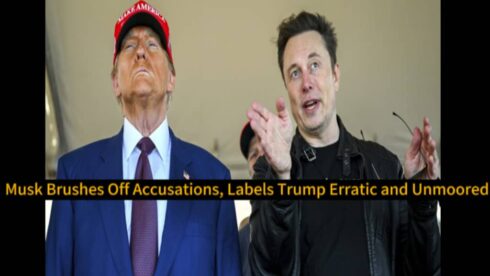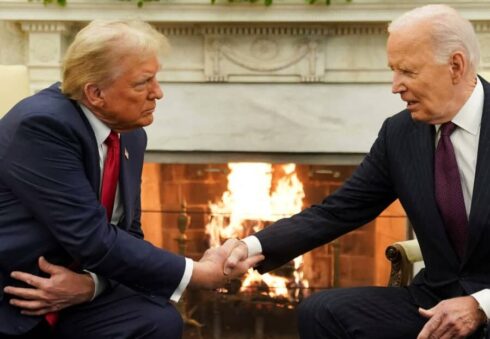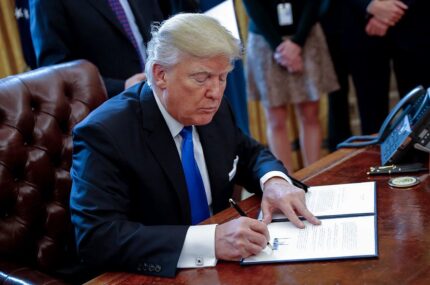In a fiery press conference at his New Jersey golf club, former President Donald Trump doubled down on his personal attacks against Vice President Kamala Harris, despite warnings from his advisers to focus on economic issues. Surrounded by tables of supermarket goods, Trump initially addressed topics like inflation, energy prices, and housing. However, halfway through his nearly 90-minute speech, he shifted his focus to Harris, labeling her a “communist” and criticizing her proposals to combat price gouging.
Donald Trump’s rhetoric against Harris, which he justified by claiming he’s “entitled to personal attacks,” reflects a strategy that top allies have cautioned against. The former president accused Harris of weaponizing the justice system against him, though he offered no evidence to support this claim. “They want me to be nice, but they’re not being nice to me. They want to put me in prison,” Trump stated, signaling his refusal to ease off the personal barbs despite concerns that such tactics could alienate voters as Harris narrows the gap in polling.
Economic Proposals Overshadowed by Harris Criticism
Donald Trump’s press conference was intended to highlight his economic proposals, particularly his promise to slash energy and electricity prices by half within the first year of a potential second term. However, his economic messaging was often overshadowed by his attacks on Harris. He criticized her economic platform, particularly her push for federal price controls to curb inflation, dismissing it as a “Maduro plan” that would backfire on the American economy.
The former president claimed that Harris’s proposals would lead to greater economic instability and accused her of trying to implement “communist price control.” Donald Trump’s assertions were met with a sharp rebuke from Harris’s campaign spokesperson, James Singer, who said, “No surprise, Trump doesn’t want to defend his agenda,” and criticized Trump for resorting to personal attacks rather than discussing substantive economic policy. Despite his criticisms, Trump did not announce any new policies, focusing instead on repeating his pledges to reduce costs for Americans.
Donald Trump Pivots to Culture Wars and Anti-Semitism Allegations
As the press conference progressed, Trump pivoted to cultural issues, lambasting Harris’s newly announced running mate, Minnesota Governor Tim Walz, for his stance on transgender rights. Donald Trump falsely claimed that “virtually 100 percent” of job growth in the last year went to migrants, an assertion aimed at undermining the economic record of Harris and President Joe Biden. He further accused Harris of pandering to anti-Semitism within the Democratic Party, warning that if she were elected, Israel’s future would be at risk.
These remarks were made during an event at Trump’s Bedminster club, where Jewish Republican leaders and major donors had gathered to discuss combating anti-Semitism. Trump, alongside billionaire donor Miriam Adelson, accused Harris of being part of a “radical” Democratic Party and implied that her policies would endanger Israel. This rhetoric underscores Trump’s broader strategy of linking Harris to extreme positions, a tactic aimed at solidifying his base but one that risks deepening divisions within the electorate as the 2024 race intensifies.
Campaign Shake-Up and Media Blitz
The Bedminster press conference came amid significant changes in Donald Trump’s campaign strategy, including a staff shake-up aimed at revitalizing his bid for the presidency. The return of key figures like Corey Lewandowski and Tim Murtaugh, veterans of Trump’s previous campaigns, signaled a renewed focus on aggressive media engagement and grassroots mobilization. The reshuffle followed weeks of surging support and donations for Harris, forcing Trump to adapt his approach and regain momentum.
In addition to the press conference, Trump has increased his media appearances, including a two-hour online conversation with X owner Elon Musk earlier in the week. However, maintaining message discipline has proven challenging. A recent address in North Carolina, intended as a major economic speech, veered off course as Trump aired familiar grievances and criticized California’s living conditions. Despite these hiccups, Trump dismissed concerns about his campaign’s trajectory, attributing low poll numbers to a historical trend that would ultimately work in his favor. “It’s a sign that we want to close it out,” he said, downplaying the significance of the campaign shake-up.
As the sun set over Bedminster, Trump’s attention occasionally wandered to the array of groceries beside him, a nostalgic reminder of simpler times. Yet, the overall message was clear: Trump remains defiant in his campaign strategy, willing to break the norms of political decorum in his bid to reclaim the White House.














